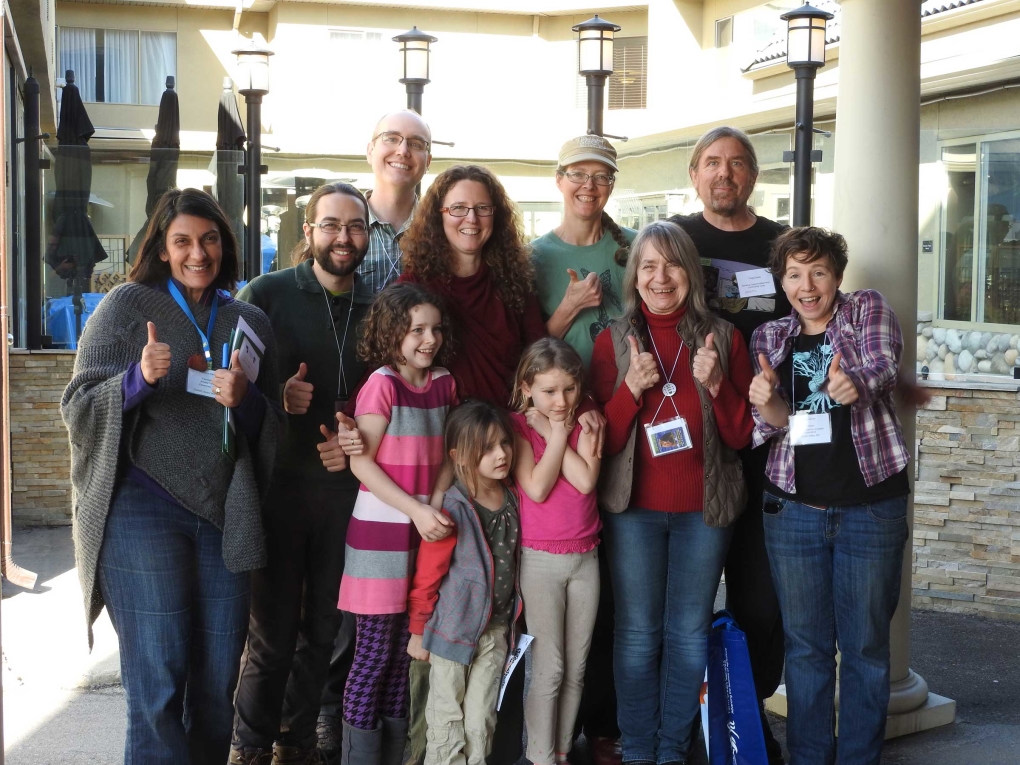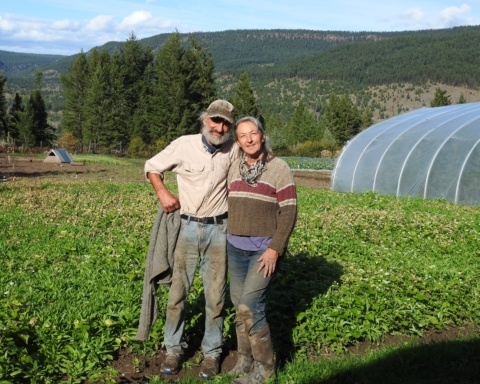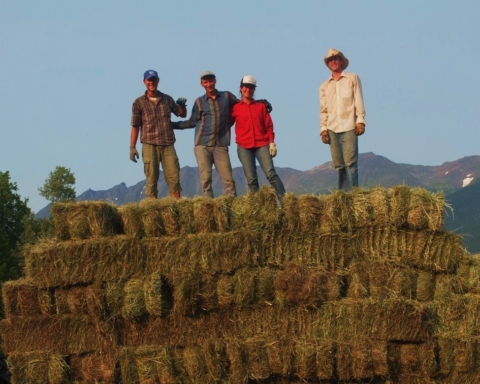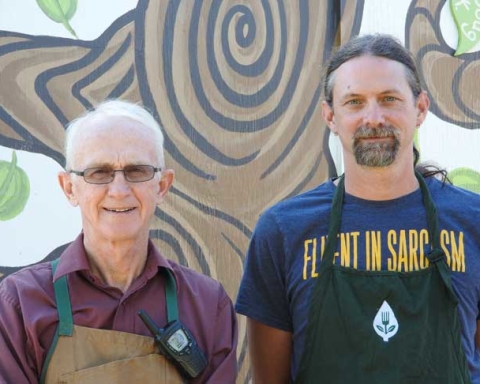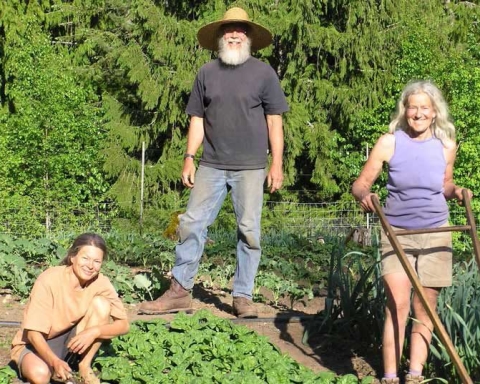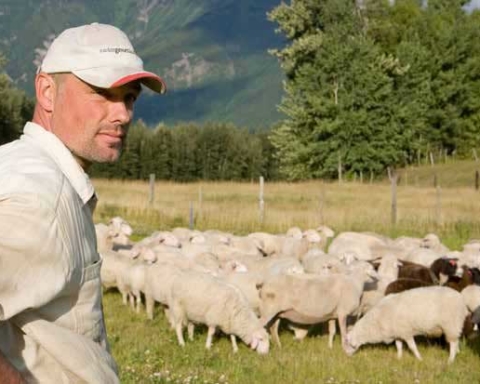Marjorie Harris, Glorious Organics, Merville Organic Growers’ Co-operative, Glen Valley Organic Farm Co-operative, and Growing Opportunities Farm Community Co-op
No two co-ops are alike—though they often bring together a blend of smart business sense and idealism that lends itself to success, both in the market and in the community.
That’s why, for this edition of Farmer Focus, we collaborated—in true co-operative spirit – with a sampling of BC’s diverse co-operative farming models. Through the personal reflections of four co-operative farms, we’ll explore everything from the economic advantages to social commitment to maintaining a unified vision.
Glorious Organics
- Workers Co-op: Incorporated 2006
- Shareholders: Five (Open to new members upon application; approval prerequisite is to work with Glorious Organic for one full year before applying)
- Vision: Organic crop production business
- Situated: On 6.6 acres land held in common by the Fraser Common Farm Cooperative Market Availability: Farmers’ markets under the banner of ‘The Organic Farm Connection,’ direct to restaurant sales, and a CSA program
Glorious Organics is a Workers Co-op that runs the farming enterprise on Fraser Common Farm (FCF). All of the current shareholders of Glorious Organics are also shareholders in Fraser Common Farm, which has been cooperatively held for 40 years. The entire property is 20 acres on two titles, allowing for more housing to be built in the future. Only 6.6 acres is intensely gardened while the rest of the acreage is as a wood lot where co-op members forage for nettles, berries, flowers, mushrooms, and more.
Glorious Organics member Susan Davidson points to one of the co-operatives unique traits: three generations currently reside on the farm. The elder members are now all over 65 years old, a few members are in their 40’s, and everyone else is under 30 years old. Fellow member Heather Pritchard explains that growth is built into their co-op model: “we are in an expansion phase right now. The growth brings in longevity to the co-op’s stewardship of the habitat and farming. It is what I love, to have a very direct relationship with the land, and I have confidence that it will carry on after I leave: a legacy of farming and community.”
Positive relationships are always an informal priority during the day-to-day group activities of co-operative property stewardship. However, occasionally more structured facilitated workshops are taken on for specific considerations like group check-ins, reconnections, re-examining purpose, or developing a new vision. The co-op has conflict resolution tools available if the need ever arises.
Growing season is an intense time for Glorious Organics. Keeping up with demand means 10 to 12 employees are hired on to assist in production, harvest, and marketing. A huge variety of salad greens and veggies are grown and this year a mushroom growing workshop will be run to facilitate a mushroom cultivation program.
The Fraser Common Farm hosts both communal and individual housing and maintains a discrete balance between sustainable food production techniques and woodland habitat conservation.
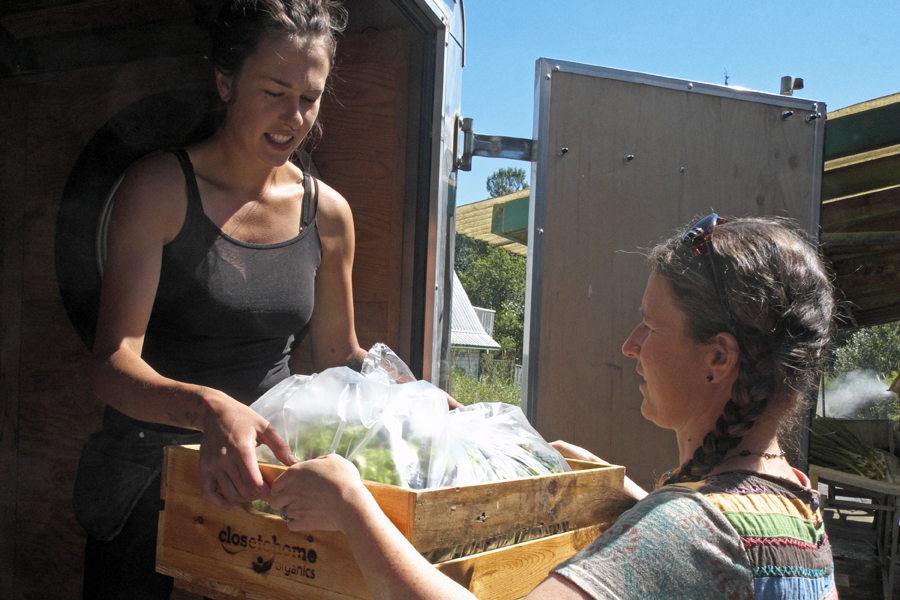
Merville Organics Growers’ Cooperative
- Participating Farms: Amara Farm, Ripple Farm, Green Arrow Farm, Kloverdalen Farm
- Non-profit Marketing Co-op: Incorporated 2015
- Shareholders: Five
- Vision: To support its members to sell organic produce and value added products through three main outlets: CSA, direct to restaurants, and farmers markets
- Situated: On five independently managed farm business land-bases
- Market Availability: Tofino Chef ’s Guild, Comox Valley Farmers Market, Campbell River Farmers market, CSA program
Merville Organic Growers Co-op is a combination of market co-op and production co-op. Founders Arzeena Hamir and Moss Dance first came together in 2012 in an informal partnership inspired by Saanich Organics.
“It made sense for us to collaborate,” says Arzeena, “I was starting my fjrst season and Moss had run a small CSA for a year. We were both looking for a way to expand and working together reduced the time both of us spent advertising and going to markets.” That first year of their collaboration saw them taking turns transporting produce from both of their farms to market and running a 30 share CSA, says Arzeena.
As more farms joined in by 2015, they incorporated through the BC Co-op Association. Merville Organic Growers’ Co-operative marketing umbrella is now home to four organic farms, whose joint shareholders are Arzeena Hamir, Moss Dance, Neil Turner, Robin Sturley, Kira Kotilla, Russell Heitzmann, and Calliope Gazetas.
The co-op shares equipment and resources located at Amara Farm, including a walk-in cooler, wash station, produce transportation, tables, tents, display bins, bulk purchases for packaging, and common signage. They also pool hands for farm labour for short term work parties (think CSA veggie washing), and for specific crop activities, such as blueberry blossom stripping, setting wireworm traps, snapping scapes, and harvesting garlic.
Economic and marketing benefits play a role in strengthening the co-op. Drought hit the Comox Valley hard last year, and Arzeena and her fellow co-op members found it a major benefit to have built in redundancy planning for certain crops. That way, if a crop failed on one or two farms, another farm could fill the gap and the co-op could avoid catastrophe.
For Arzeena and the other co-op members, clearly defining responsibilities has been very important: “Russell is the CSA manager, I’m the market manager, Robin is our restaurant liaison. We each have the autonomy to develop each role as we see t and if we need help we ask for it. We are all stakeholders, and because of that we all take on leadership roles.” Russell adds, “Sharing the workload of selling produce gives us all more time to actually grow food. When we do work for the co-op it benefits everyone.”
Frequent and clear communication is the key to the co-op’s success, says Russell. “If anyone has an issue or suggestion, they bring it to the group. We know that everyone is going to hear each other out and take concerns seriously. It really helps that we’re all good friends. And good cooks! We share meals together often, not just before meetings but also just in a social context. I think it helps us remember why we are doing this. We meet once a week, at each farm in a rotation, for dinner, socializing, and business meetings.”
The social commitment to the groups’ goals is supported by strong relationship building both informally and through formal business meetings and visioning retreats. Informal relationship building happens very naturally when packing for the CSA together when doing other common work together. A retreat for strategic planning and visioning is usually planned for November, once the fervour of the busy season has cooled.
GlenValley Organic Farm Co-operative
- Home to: Close to Home Organics, Earth Apple Organic Farm, Pitchfork Organic Farm, Mina’s Honey Pot
- Agricultural Production Co-op: Incorporated 1998
- Shareholders: 50 ($5000 per “par value” share. Unlimited shares are available)
- Vision: to ‘feed and educate present and future generations by co-operatively holding, stewarding and sustainably farming our land’
- Situated: on unceded Stó:lō First Na on territory and is a diverse mix of fertile loam, woodland, and wetland along the south bank of the Fraser River in Mt. Lehman BC
- Market Availability: Langley Farmers Market, Lonsdale Quay Farmer’s Market, Trout Lake Market, Nat Bailey Market, and a CSA program
“Glen Valley Organic Farm (GVOF) thrives today because of the determined social investment and long term vision of its founding members in 1998,” says Chris Bodnar. Chris is thankful for the co-operative model: GVOF has made organic farming a viable career choice for himself and his partner Paige Dampier, who live on the farm with their three children. He recounts how in the beginning some founding shareholders mortgaged their own homes to put up the money for financing. Vancity played a fundamental role in GVOF’s creation by lending the mortgage, providing a $20,000 grant, and offering an interest rate reduction – all of which helped the co-operative pay off the mortgage in 2007.
Chris emphasizes the depth of the social investment the 50 non-resident members contribute as he walks me past the large labyrinth planted in flowers.
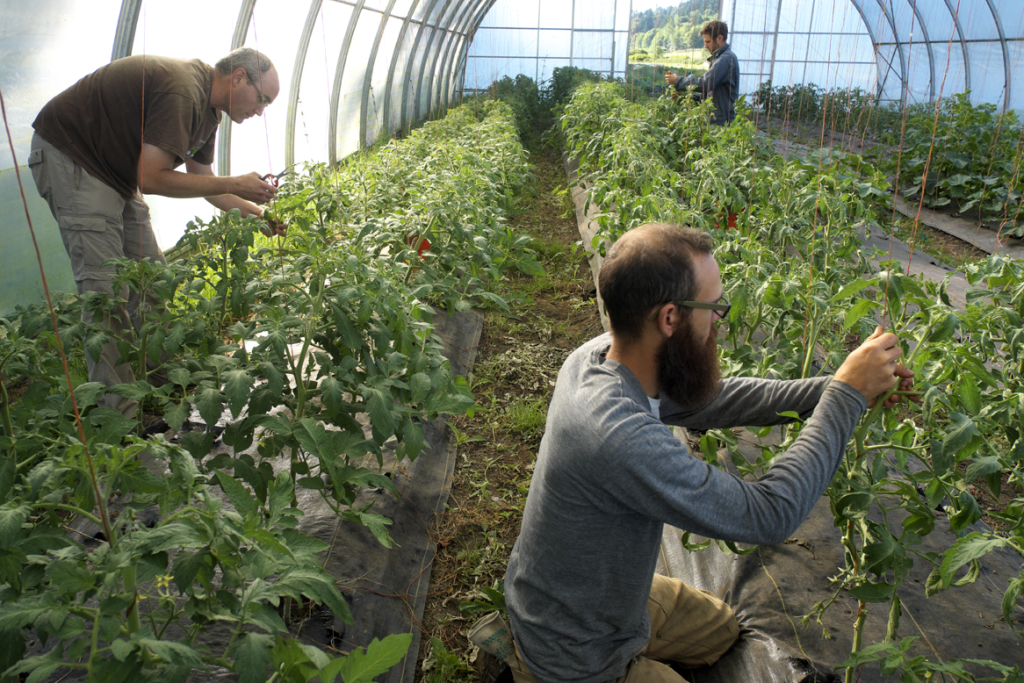
He tells me how Jo Wilson, 82 years old, steadfastly rides her bicycle out on summer weekends to joyfully tend to all of the flowerbeds and the amazing flower labyrinth. Mina’s Honey Pot offers another glimpse of the diversity of opportunity offered by the co-operative model of GVOF. A hobby project of shareholders Tricia Carpenter and her granddaughter Mina, they began their apiary in 2010. Their beekeeping project dovetails into farming activities with the goal of increasing crop production through pollination and producing sweet rewards of honey for the co-op, market, and friends.
Since its formation, GVOF has been home to a succession of organic farming businesses that help to meet the co-ops mandate to provide access to certified organic food for shareholders and the local community. Once again, succession of farm businesses is underway. Jeremy Pitchford, of Pitchfork Organic Farm, is being succeeded by Shirelle Cote of Earth Apple Organic Farm. During the two year planned transition, Shirelle has already planted an orchard and Jeremy is preparing an organic seed production business. Chris & Jeremy both came on board nine years ago when they succeeded from John Switzer.
Jeremy recalls his gratitude for John’s long four year mentorship, teaching the newbie farmers the skills of the trade, and for the ongoing harvest of John’s farming foundations. He affirms the value of taking every opportunity to engage with other shareholders over lunch or meetings to manifest the co-operative vision into a living, on-the-ground, dynamic farm.
The co-op members’ social investment is further solidified by participation in every aspect of planning and consensus decision making by the various management teams. Shareholders meet regularly over shared meals, frequent business meetings and special events. There are many perks for the non-resident shareholders, such as discounts on organic produce, and access to the forests and farmland for gatherings, special events, and environmental stewardship opportunities.
Glen Valley Organic Farm Co-operative is an active member of several like-minded organizations including the BC Association of Regenerative Agriculture, the Community Farm Network, FarmFolk/CityFolk, and the BC Association of Farmers Markets.
Growing Opportunities Farm Community Co-op
- Non-profit Community Service Co-op: Incorporated 2013
- Shareholders: 12 ($20 per share)
- Vision: A Community Farm Co-op designed to provide members with the skills and the experience of farming, food processing, food gathering, cooking, freezing, and further, to assist people to be more food secure by working together
- Situated: 3 leased locations in the Nanaimo area farms (12 acre + 5 acres parcels + 1 greenhouse)
- Market Availability: Nanaimo Foodshare, Bason Farmers Market, Bowen Road Farmers Market, Cedar Farmers Market
The Growing Opportunities Farm Community Co-op was started in 2009 on Providence Farm in the Cowichan Valley. According to co-op co-founder Craig Evans, the inspiration arose when FarmFolk CityFolk, and The Land Conservancy (TLC) hosted a meeting exploring different ways to engage people in using and preserving farmland. From those initial meetings a group of roughly 30 “nebulous anarchists” started farming together on an acre of land leased from Providence. “The priority was to grow food for ourselves and learn the skills required to work together,” says Craig.
The following year saw the group expand, and soon after that, they formally registered two co-ops: Farmship Growers Co-op, a for-pro t co-op, and the nonprofit Growing Opportunities Farm Community Coop in 2013. The glue that holds the shareholders to the common vision, Craig says, ”is just the joy of working together, that sense of sister and brotherhood in the Fields and greenhouse, and the chatter over social media with friends.”
They work with all skills and abilities, and continue to support people with mental health and learning challenges. Jen Cody, who volunteers with Growing Opportunities, sums it up: “In our culture, working co-operatively is a skill set we need to actively teach each other in order to demonstrate how effective we are when we our skills are combined.”
Growing Opportunities is currently involved in a Carrot Seed Research Project, (see the Spring 2014 issue of the BC Organic Grower, Vol 17, Issue 2) through the Bauta Family Initiative on Canadian Seed Security, and manages the volunteer and educational programing for Farmship Growers Co-op.
In British Columbia the BC Co-operative Association and Vancity Credit Union’s Small Growers Fund & Microloan program play major supporting roles in helping to establish and maintain co-ops through legal assistance, financial funding and business networking. If you are thinking of forming a co-op they are sure places to start your enquiry.


